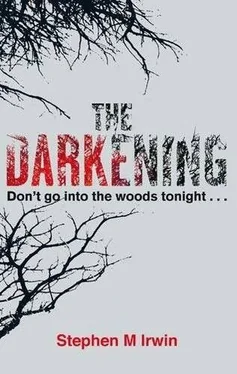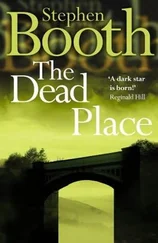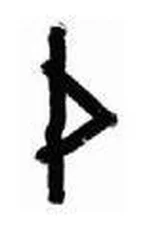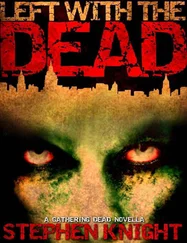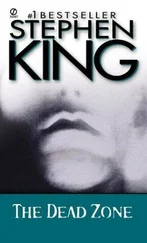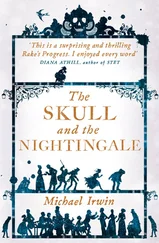Stephen Irwin - The Dead Path
Здесь есть возможность читать онлайн «Stephen Irwin - The Dead Path» весь текст электронной книги совершенно бесплатно (целиком полную версию без сокращений). В некоторых случаях можно слушать аудио, скачать через торрент в формате fb2 и присутствует краткое содержание. Жанр: Триллер, на английском языке. Описание произведения, (предисловие) а так же отзывы посетителей доступны на портале библиотеки ЛибКат.
- Название:The Dead Path
- Автор:
- Жанр:
- Год:неизвестен
- ISBN:нет данных
- Рейтинг книги:5 / 5. Голосов: 1
-
Избранное:Добавить в избранное
- Отзывы:
-
Ваша оценка:
- 100
- 1
- 2
- 3
- 4
- 5
The Dead Path: краткое содержание, описание и аннотация
Предлагаем к чтению аннотацию, описание, краткое содержание или предисловие (зависит от того, что написал сам автор книги «The Dead Path»). Если вы не нашли необходимую информацию о книге — напишите в комментариях, мы постараемся отыскать её.
The Dead Path — читать онлайн бесплатно полную книгу (весь текст) целиком
Ниже представлен текст книги, разбитый по страницам. Система сохранения места последней прочитанной страницы, позволяет с удобством читать онлайн бесплатно книгу «The Dead Path», без необходимости каждый раз заново искать на чём Вы остановились. Поставьте закладку, и сможете в любой момент перейти на страницу, на которой закончили чтение.
Интервал:
Закладка:
You killed her.
“Shh,” he told himself.
Because you just had to take the bike.
“Shut up.”
There, said the voice in his head, arguing with yourself. The slippery slope to madness. No wonder you couldn’t keep a job.
No. Not true. He was never fired. He quit.
And why was that?
Because the old shit he sought for a living tended to be found in old places. And the older the place, the more chance it had of being…
He didn’t want to think the word.
Go on. Say it. It doesn’t bite. Not anymore.
“Haunted,” he whispered.
The word hung in the air like despair in a dying man’s bedroom. It was still hanging, as if it were itself a ghost, when Nicholas sucked it back in with a gasp.
T ime had frozen here.
While his mind had dragged through the thorny brambles of his last few months in London, his hands had steered him by dormant habit six kilometers out from the glass spires of the city and into the quiet Brisbane suburb of his childhood.
Tallong.
For his first eighteen years this had been his home suburb. Earth had first been broken here not twenty years after the city was founded in the mid-1800s. Then the rolling hills of Tallong had been cleared of dense native forest, dotted with farmhouses, and infected with Friesian cows and sheep. But the town became a city, and as it breathed in and its chest pushed out, the paddocks of Tallong were striped with gravel streets. Distinctive clapboard homes with one window glinting from under a high gable and a cheeky wink for a side veranda began to spread along the new roads-avenues with names occasionally Aboriginal but mostly Anglo, as breezy as open sulkies and jauntily optimistic as the residents who built there. Pennyworth Street. Wool Street. Harts Avenue. Princess Street.
Tramlines were laid. Gas lines went in. Bitumen covered the gravel. Tramlines were ripped up. Telephone poles were sunk between yawning jacarandas and festive red-frosted bottlebrush.
In the sixties, when memories of the privations of war and rationing had lost their sting, the wood and iron houses were viewed with eyes now brought to a critical sharpness by the sight of rockets streaking skyward from Kennedy and Baikonur and Woomera. Some houses were torn down and replaced with monolithic hulks of pale brick and yellow glass. Septic tanks were drained and sealed. Sewer lines were dug in. The suburb grew green and fat and settled, a contented dame lounging by a slow loop of river; the fat queen of a well-made hive. Her only wildness was a wide corner of untouched native forest at her edge. Two square kilometers of rippling hillocks thick with trees, ripe for razing and selling and sprinkling with a thousand new houses.
It was the sight of the woods that made Nicholas suck in his breath and step on the brake. They were still there.
He stared out the side window. He was on Carmichael Road, the street he’d walked almost every day to and from school until he was ten. And later, as a teenager, he had no choice but to pass these woods in the bus on his way to high school, then on foot on his way to the train station and college.
Seventeen years he’d been gone. In that time, the value of the houses here must have tripled. Yet this huge tract of densely wooded land sat at the edge of the suburb, unassailed. The moon was up now, furbishing the pelt of the treetops silver. The forest’s bulk glowered below, black as shadowed eyes under a severe brow, watching…
He opened the door and stepped into the crisp night air. He walked across the crackling grass of the no-man’s-land between Carmichael Road and the dark-toothed edge of the woods.
How could they still be here? Some developer should have snapped up the huge block, cleared it, slashed it, veined it with new streets with bromidic names like Spinnaker Court and Mahogany Place, and salted it thickly with pastel-rendered McMansions. Yet here they were, extant and untouched. Was it Crown land, fiercely guarded by some cleverly written covenant? Maybe a park was planned? Perhaps the developers were just waiting till house prices boomed again?
Nicholas’s feet crunched on gravel, and he stopped.
He stood on the same path he used to take home from school. A path on which he’d found something small and disturbing, something silently awful and strange and offensive…
His nostrils flared and his heart-as if having heard its own starter’s pistol-began thudding in his chest. The memory of a hot November day a quarter-century ago reached out of the woods, put its sly hands inside him, and knotted his stomach. He’d been ten. He was with his best friend, Tristram. Running. Terrified. Chased. Soon after, Tristram was dead.
Apart from the silvery whisper of the chill air in the leaves, the night was silent.
Nicholas realized he was avoiding looking at the tree line. He dragged his eyes from the bright crowns of the trees down to the dark trunks. They stood like a row of black teeth, endlessly huge, stretching left and right into the night. The maw of some undersea thing, some behemoth, sentient and unquiet. Waking as it scented prey.
Something’s coming.
The woods were alive. His heart hammered behind his sternum. Something inside the trees had sensed him, tasted him on the cold air. Recognized him.
It was coming.
Go! he yelled in his head. Run!
But his body was frozen. His feet would not move. His fingers hung cold as icicles. His eyes were locked on the darkly grinning trees, waiting for them to open and for whatever they held to reach from their damp innards and take him and consume him and leave him slit and empty and drained as Tristram’s little body had been so many years ago. And part of him welcomed that fate.
Nicholas flinched. A raindrop hit his scalp. Another, his cheek. And another. His head, as if released from some dark spell, jerked upward.
The sky, clear and starry at the airport, was now an eyelid half-closed; clouds as black and inscrutable as the woods before him had consumed the sky to its zenith and were marching further overhead, already dropping their ordnance of cold, heavy drops.
A whisper of white flickered at the corner of his eye. He turned, catching a glimpse. Something small and pale flickered away between the dark trunks, as if devoured by the trees.
His galloping heart was shaking his whole body. He again told himself to turn; this time his body listened, and he put his back to the biding woods and strode through the matchstick grass to his car.
It took all his willpower not to run.
R ain rioted on the tin roof.
Nicholas watched his mother pour steaming water into a teapot, glumly mesmerized by the billowing clouds of steam. The sight of her making tea was so familiar that it could have been transposed, with just a little loosening around the edges, from two decades ago. The kitchen had been freshened with new benchtops and a stainless-steel fridge, and his mother was the same, maybe a bit heavier and just a little shorter. Seventeen years, and nothing had changed. The thought made him tired.
“Your sister is coming up from Sydney tomorrow.”
Katharine Close’s voice had a singsong matter-of-factness that suggested schoolteacher or marriage counsellor. In the early seventies, she had been a weather girl at a local television station-a shapely lodestone for the discussion of meteorological events in service station garages and on fairways. Katharine had just been offered the upward move to reading the six o’clock news when she fell pregnant with Nicholas. Motherhood then separation then widowhood conspired to pretty well put a bullet behind the ear of her fledgling television career. She raised her two children alone. When they were both old enough for school, she cleaned houses until she had squirreled away enough to buy herself a kiln and wheel. Then she sheeted up a small studio between the stumps under the house and taught herself the secrets of clay and flux and glaze. She paid for her habit by selling her pots and platters at farmers’ markets and teaching a handful of students when the mood took her. On the kitchen dresser, Nicholas saw berthed a small armada of perhaps twenty teapots.
Читать дальшеИнтервал:
Закладка:
Похожие книги на «The Dead Path»
Представляем Вашему вниманию похожие книги на «The Dead Path» списком для выбора. Мы отобрали схожую по названию и смыслу литературу в надежде предоставить читателям больше вариантов отыскать новые, интересные, ещё непрочитанные произведения.
Обсуждение, отзывы о книге «The Dead Path» и просто собственные мнения читателей. Оставьте ваши комментарии, напишите, что Вы думаете о произведении, его смысле или главных героях. Укажите что конкретно понравилось, а что нет, и почему Вы так считаете.
